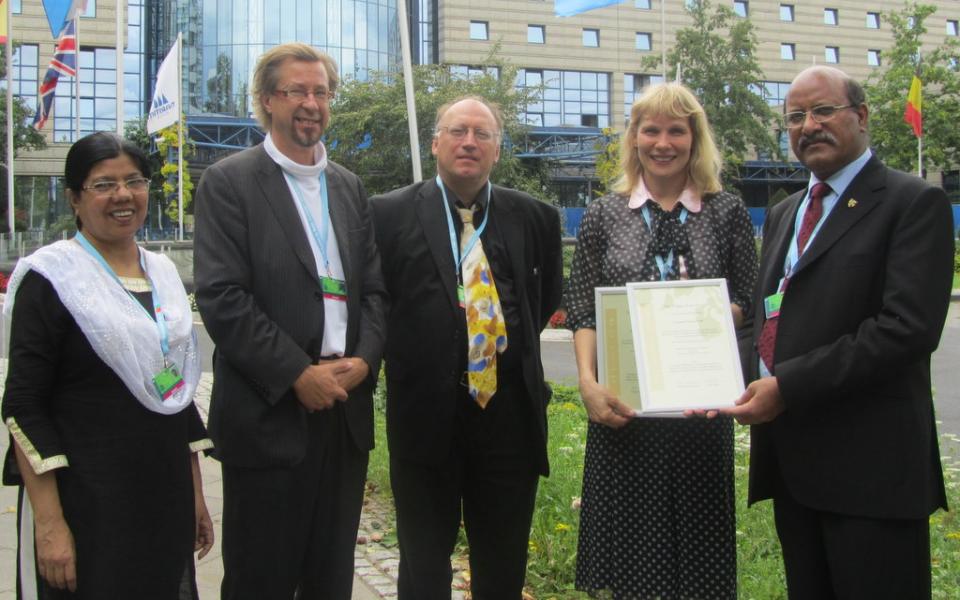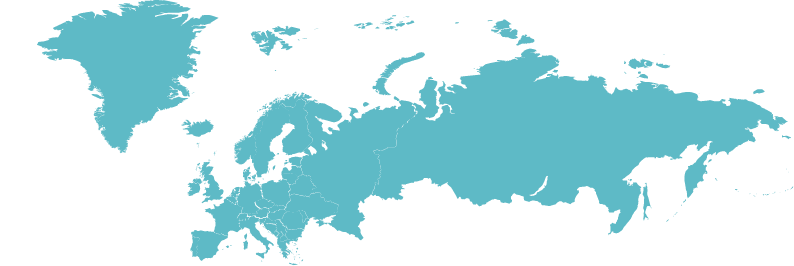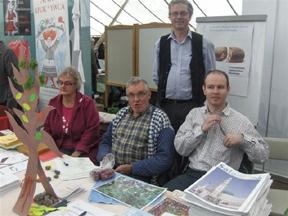
Father James Channan receiving the Golden Rule Award certificate from Aarni Moisala of URI Finland.
Finland's Interfaith Dialogue Network has given the 2011 Golden Rule Award to two leaders in Christian-Muslim cooperation in Pakistan. Dominican priest Father James Channan and Grand Imam Maulana Syed Muhammad Abdul Khabir Azad have worked together for years to promote religious harmony. Last year's awardee was the President of Finland, Tarja Halonen.
Father James Channan, Regional Coordinator in Pakistan for United Religions Initiative (URI), is a Director of the Peace Center of the Dominican Order in Pakistan. As an interfaith and Catholic leader, fr. Channan has been regularly consulted on religious issues by Pakistan’s government and lectures on interfaith peace building around the world.
Grand Imam Maulana Abd-ul Khabir Azad, URI´s Global Council Trustee, is distinguished internationally as a leader who promotes interfaith understanding and cooperation for peace, reconciliation, and addressing urgent human needs. A few years ago, Mr. Maulana Abdul Khabir Azad organized the first interfaith conference inside the Badshahi mosque, which is the largest mosque in Lahore, Pakistan.
Fr. Channan OP sees great hope in Pakistan. “The interfaith dialogue is not just coming together to talk and have a cup of coffee. The work is aimed at having dialogue at every level of life,” he says, and goes on to say that they have, for example, helped those affected by the floods in Pakistan.
The Golden Rule Award is a stone given as a sign of gratitude towards people who try to implement The Golden Rule in practice. Each stone is chosen by a previous awardee.
Professor Emeritus Reijo E. Heinonen, who received the award in 2009, says that the stones challenge human responsibility and remind us of our mutual interdependence.
The prize is awarded annually on the United Nations International Day of Peace, September 21st. A certificate representing the award was presented to fr. James Channan OP in Bonn, September 4th, at the 64th Annual United Nations Conference for DPI/NGO on the theme “Sustainable Societies; ResponsiveCitizens.” Conference Chair Felix Dodds was present at the ceremony and congratulated the Pakistani team.
“The religious communities, faith based organizations and people from different faiths can play a big part in motivating people to act together based upon common values for a sustainable lifestyle,” says Heidi Rautionmaa, Finland’s Interfaith Dialogue Network Coordinator. Rautionmaa sees that faith should inspire and encourage people for needed environmental awareness, ecological practices and social engagement. There is no peace and justice if there is not a sustainable way of life.
The Interfaith Dialogue Network in Finland consists of Helsinki Religious Forum of The United Religions Initiative, Religions for Peace Suomen naisverkosto (Religions for Peace Finnish Women of Faith Network), Kaupunki yhteisönä ry. (Living together in cities) and international Uskot ilman rajoja ry. (Faiths Without Borders).
The network works in fellowship with the Parliament of the World's Religions. Interfaith Network in Finland supports the Earth Charter Iniative toward RIO + 20.

